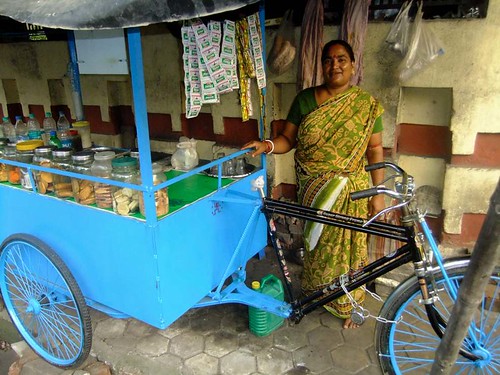B is for BICYCLE
In Kolkata, bicycles are used in a huge variety of ways, not just to move individuals from Point A to Point B.
As I look around the roads, I notice more clearly the extent to which cycles are used for delivery and transport. In fact, due to the fact that it is the cheapest way to move around, a huge number of deliveries are done on the bicycle: bread, water, milk canisters, gas cylinders, heavy brick loads, municipal waste, empty water bottles, furniture and other gargantuan loads and materials.
Many vegetable sellers bring their vegetables from rural areas into local city markets on their cycles and often the cycle is fashioned into a cart from which the vendor can then sell off of. Many tea shops are cycle-based so that the chai wallah can easily come and set up in their favorite location each day. There are many cases where the cycle carries a shop at the back or front and the rider sets up in different areas to sell right off of the cycle. The ice cream seller who pedals an ice chest and awning in front is one such example. The cycle rickshaw is also a very common sight on the roads here, a pedal-powered cart is used to carry school children or to carry people/goods short distances around neighborhoods.
Unfortunately, the promotion and acknowledgment of cycles as an eco-friendly alternative is not really promoted here. It is still due to economic reasons that people choose to transport people and goods by cycle. A campaign that promotes cycles and rewards those pedal-powering them would be a positive way to raise awareness that cycles are a green choice.
Next time you ride, be sure to thank the cycle rickshaw wallah for going green!
As I look around the roads, I notice more clearly the extent to which cycles are used for delivery and transport. In fact, due to the fact that it is the cheapest way to move around, a huge number of deliveries are done on the bicycle: bread, water, milk canisters, gas cylinders, heavy brick loads, municipal waste, empty water bottles, furniture and other gargantuan loads and materials.
Many vegetable sellers bring their vegetables from rural areas into local city markets on their cycles and often the cycle is fashioned into a cart from which the vendor can then sell off of. Many tea shops are cycle-based so that the chai wallah can easily come and set up in their favorite location each day. There are many cases where the cycle carries a shop at the back or front and the rider sets up in different areas to sell right off of the cycle. The ice cream seller who pedals an ice chest and awning in front is one such example. The cycle rickshaw is also a very common sight on the roads here, a pedal-powered cart is used to carry school children or to carry people/goods short distances around neighborhoods.
Unfortunately, the promotion and acknowledgment of cycles as an eco-friendly alternative is not really promoted here. It is still due to economic reasons that people choose to transport people and goods by cycle. A campaign that promotes cycles and rewards those pedal-powering them would be a positive way to raise awareness that cycles are a green choice.
Next time you ride, be sure to thank the cycle rickshaw wallah for going green!


1 Comments:
I like this series!
Bicycles are really great. I want, in future, to live in countryside without using petrol. There are many things we can leasrn from this great bicycle culture of India.
In Japan too, many those 'takuhai-bin'(delivery service company) started using bicycles with a big container bihind.
Post a Comment
Subscribe to Post Comments [Atom]
<< Home